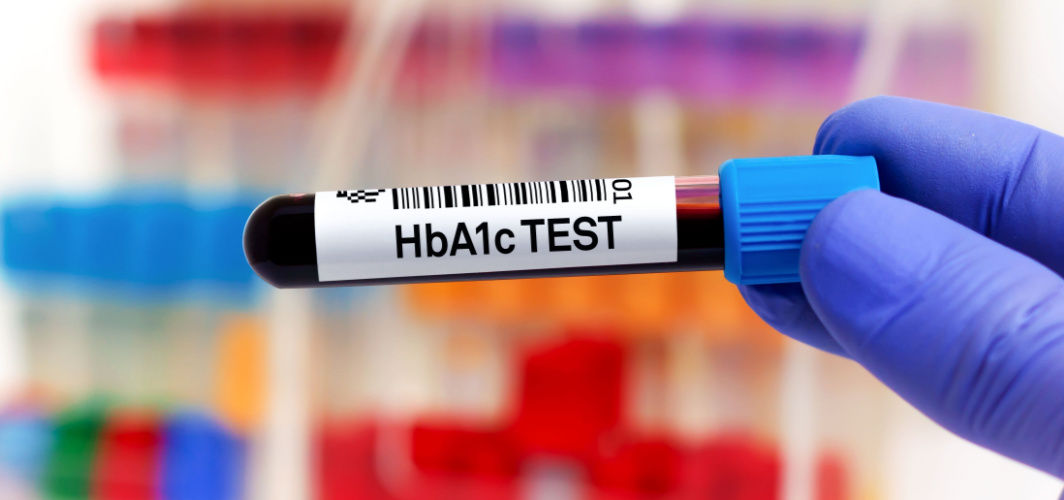Diabetes Management
How To Bring Down The HbA1c Level?
4 min read
By Apollo 24|7, Published on - 17 January 2023, Updated on - 05 September 2023
Share this article
0
5 likes

Rather than getting fasting and post-meal blood sugar levels checked, nowadays doctors often prescribe the HbA1c test. The HbA1c blood test primarily evaluates the three-month average blood sugar level of an individual. However, it can also be used to diagnose diabetes mellitus and assess a patient's glycaemic control if they already have been diagnosed. Keeping your HbA1c level within the normal range is the best way to prevent diabetes-related complications.
How do HbA1c levels determine sugar levels in the blood?
Haemoglobin in your red blood cells binds to glucose present in your blood. The HbA1c blood test calculates the amount of glucose bound to the haemoglobin. Since red blood cells typically have a lifespan of about three months, the test shows the average blood glucose level over the previous three months. If your blood glucose levels have been high over the past few weeks, your HbA1c test results will also be higher than normal.
What is the normal HbA1c level?
Normal HbA1c values range between 4% and 5.6% for people without diabetes. You have pre-diabetes and a higher likelihood of developing diabetes if your HbA1c levels lie between 5.7% to 6.4%. Diabetes is diagnosed when levels reach 6.5% or higher.
How To Lower hba1c Levels?
In diabetic patients, lower HbA1c values signify effective blood sugar management. However, people with high or borderline HbA1c levels may wonder how can they bring their HbA1c levels down. Here are a few lifestyle changes and treatment plans that may help you keep your HbA1c levels in the normal range:
- Plan a diet with low glycaemic index foods such as green vegetables, raw carrots, beans, chickpeas and lentils to regulate blood glucose levels.
- Be mindful of the portion sizes of the food.
- Start a good exercise regime to manage weight.
- Eat a fibre-rich diet to control sugar spikes.
- Take your oral hypoglycaemic medications as prescribed.
- Track your blood glucose levels with a glucometer at home.
- Consult your doctor regularly and get your lab tests done for HbA1c as and when prescribed by your doctor.
Regulating your HbA1c level is key to successful diabetes management. Making certain lifestyle changes, such as eating a balanced diet, especially low glycaemic foods, exercising, and taking medications regularly can help to effectively control HbA1c levels. If you are diabetic, make sure to consult a doctor and a nutritionist before making any changes to your diet and exercise routine.
FAQs
1. Is the HbA1c test better than other glucose tests?
Yes, HbA1c levels give a better picture of blood glucose control over three months, unlike other blood glucose tests which only provide a one-time status of sugar level in the body.
2. Which foods reduce HbA1c?
A diet devoid of refined carbohydrates and rich in protein, healthy fats, whole grains and fibre can have a positive effect on HbA1c levels.
3. What is the HbA1c test price?
The HbA1c test price varies among different laboratories across different regions. Usually, the test price ranges between INR 300 and INR 1000 across different states in India.
4. How many times do you have to take an HbA1C blood test?
For a healthy or pre-diabetic person, taking the HbA1c blood test twice a year is sufficient. However, if you are diabetic taking the test quarterly or 4 times a year is recommended.
5. How to bring HbA1c down?
HbA1c levels can be brought down by following a strict diabetes-friendly regimen that includes cutting down on sugary foods, exercising regularly, and taking prescribed medications regularly.
Talk to a doctor to get the best guidance.
Consult An Apollo Diabetologist
You can also manage your diabetes like a pro with Apollo 24|7's 12-week empower programme.
Medically reviewed by Dr Sonia Bhatt.
Diabetes Management
Consult Top Diabetologists
View AllLeave Comment
Recommended for you

Diabetes Management
Can People with Diabetes Run a Marathon?
Individuals with diabetes can indeed run marathons, but it requires careful planning and diligent management—diabetes, whether Type 1 or Type 2, can be managed effectively during marathon training and races. Monitoring blood sugar levels, adjusting medication, and maintaining proper nutrition and hydration are crucial. Seeking guidance from healthcare professionals who specialise in diabetes care is vital for a safe and successful marathon journey. Diabetes should not deter anyone from pursuing their marathon dreams with the right strategies and determination.

Diabetes Management
Is Air Travel Safe During Diabetes? 7 Tips for a Comfortable Journey
Individuals with diabetes must be well-prepared before air travel. Consult your healthcare provider, pack essential supplies in your carry-on, ensure proper medication storage, carry diabetes-friendly snacks, stay hydrated, adjust meal timing if needed, and stay active during the flight. With careful planning and these crucial steps, you can travel confidently, knowing you're equipped to manage your diabetes effectively throughout the journey.

Diabetes Management
What Not to Eat in Diabetes: A Guide to Managing Your Diet
Effective diabetes management involves being aware of what not to eat. Avoid sugary beverages, snacks, and sweets, while also limiting white bread, fried foods, and full-fat dairy. Processed meats, sweetened condiments, high-sugar cereals, and alcohol should be consumed in moderation. Opting for healthier alternatives can help control blood sugar levels and reduce the risks associated with diabetes. It's essential to seek guidance from healthcare professionals or dietitians to create a personalised diabetes management plan that suits your unique needs and goals.
Subscribe
Sign up for our free Health Library Daily Newsletter
Get doctor-approved health tips, news, and more.
Visual Stories

8 Fruits That are Incredibly Healthy for Diabetes
Tap to continue exploring
Recommended for you

Diabetes Management
Can People with Diabetes Run a Marathon?
Individuals with diabetes can indeed run marathons, but it requires careful planning and diligent management—diabetes, whether Type 1 or Type 2, can be managed effectively during marathon training and races. Monitoring blood sugar levels, adjusting medication, and maintaining proper nutrition and hydration are crucial. Seeking guidance from healthcare professionals who specialise in diabetes care is vital for a safe and successful marathon journey. Diabetes should not deter anyone from pursuing their marathon dreams with the right strategies and determination.

Diabetes Management
Is Air Travel Safe During Diabetes? 7 Tips for a Comfortable Journey
Individuals with diabetes must be well-prepared before air travel. Consult your healthcare provider, pack essential supplies in your carry-on, ensure proper medication storage, carry diabetes-friendly snacks, stay hydrated, adjust meal timing if needed, and stay active during the flight. With careful planning and these crucial steps, you can travel confidently, knowing you're equipped to manage your diabetes effectively throughout the journey.

Diabetes Management
What Not to Eat in Diabetes: A Guide to Managing Your Diet
Effective diabetes management involves being aware of what not to eat. Avoid sugary beverages, snacks, and sweets, while also limiting white bread, fried foods, and full-fat dairy. Processed meats, sweetened condiments, high-sugar cereals, and alcohol should be consumed in moderation. Opting for healthier alternatives can help control blood sugar levels and reduce the risks associated with diabetes. It's essential to seek guidance from healthcare professionals or dietitians to create a personalised diabetes management plan that suits your unique needs and goals.

